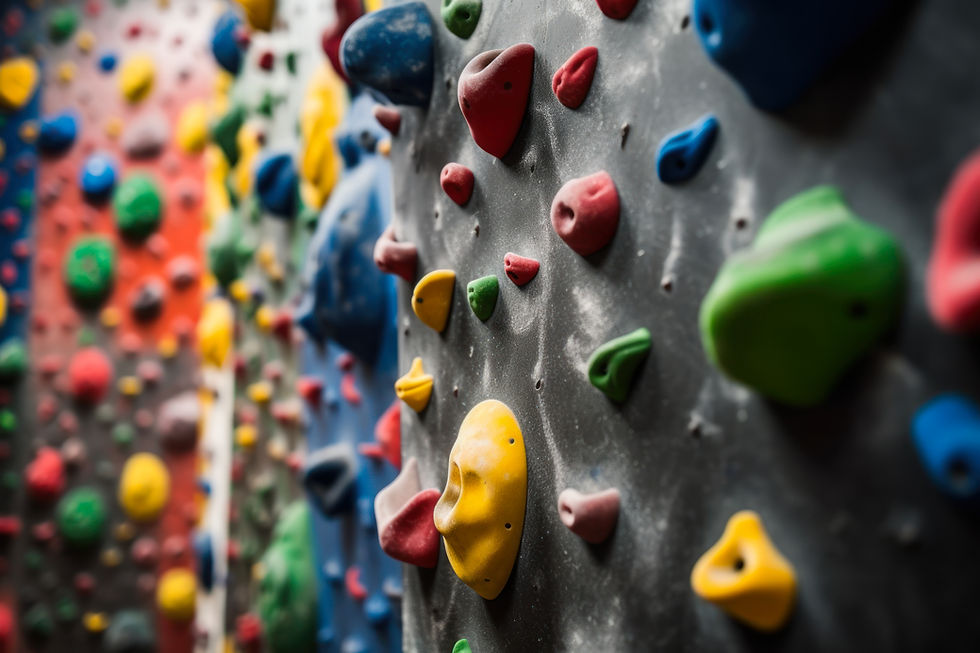Mental and Physical Benefits of Indoor Rock Climbing
- Kristi Bass

- Jul 24
- 3 min read
Updated: Sep 9

If you’re looking for a fitness routine that doesn’t require going to a traditional gym, rock climbing may be for you. In recent years, indoor rock climbing has moved from the fringe to the mainstream, becoming one of the fastest-growing fitness trends around the world. With climbing gyms popping up in urban centers and college campuses everywhere, more people are discovering that this full-body workout is about more than just scaling walls — it offers a powerful combination of mental and physical benefits that few other sports can match.
Physical Benefits: A Total Body Workout
1. Strength and Endurance
Climbing engages almost every major muscle group. Your legs push you upward, your arms and back pull, your core stabilizes your movement — all while holding your body against gravity. Over time, climbers build lean muscle mass and significant muscular endurance without the joint strain often associated with high-impact activities like running.
2. Flexibility and Balance
Success in climbing often depends more on fluid motion and body awareness than brute strength. Climbers develop better flexibility as they learn to stretch and twist their bodies into various positions to reach holds. Good balance becomes crucial as well, improving posture and coordination both on and off the wall.
3. Cardiovascular Health
While climbing might not look like a typical cardio workout, it elevates heart rate and improves circulation. Particularly during longer climbs or bouldering sessions with short rests in between, the cardiovascular system is challenged, helping to improve endurance and overall heart health.
4. Low-Impact, High-Reward
Unlike sports that stress joints through repetitive impact, indoor climbing is relatively gentle on the body, making it an attractive option for people recovering from injuries or those seeking a sustainable, long-term fitness habit.
Mental Benefits: Training the Mind
1. Focus and Problem Solving
Each climbing route, or “problem,” is like a physical puzzle. Climbers must evaluate routes, plan their moves, and adapt mid-climb — all while managing their physical output. This sharpens problem-solving skills and promotes mindfulness, keeping the climber fully present in the moment.
2. Stress Reduction
Engaging in climbing helps reduce cortisol levels (the stress hormone), similar to other forms of moderate to vigorous exercise. The intense focus required also acts as a form of moving meditation, helping to clear the mind and reduce anxiety.
3. Confidence and Self-Efficacy
There’s something empowering about reaching the top of a route you once found intimidating. Regular climbing builds confidence and resilience, teaching climbers to face fear, trust themselves, and celebrate progress over perfection.
4. Community and Belonging
Despite its individual nature, climbing fosters a strong sense of community. Climbers often encourage and spot one another, share tips, and celebrate victories together. This social support can be a powerful factor in improving mental health and sustaining motivation.
Climbing for All Ages and Levels
One of the great appeals of indoor climbing is its scalability. Gyms offer routes for every skill level, from absolute beginners to elite athletes. Adaptive climbing programs are also expanding, making the sport accessible for those with physical disabilities.
Whether you're looking to build physical strength, reduce stress, improve mental clarity, or just try something new and fun, indoor climbing offers a well-rounded solution. As more people discover its benefits, climbing is not just becoming a sport — it’s becoming a lifestyle.
Ready to Climb? Next time you’re searching for a way to shake up your fitness routine or need a mental reset, consider heading to a local climbing gym. You might find the challenge — and the community — you’ve been looking for.


